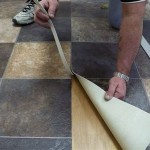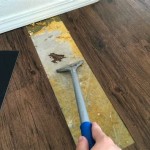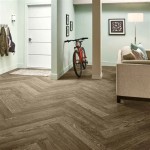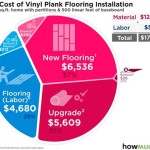Vinyl Plank Flooring On Concrete: A Comprehensive Guide
Vinyl plank flooring has become a popular choice for both residential and commercial spaces due to its durability, water resistance, aesthetic versatility, and ease of installation. One of its significant advantages is its suitability for installation over concrete subfloors. However, successfully installing vinyl plank flooring on concrete requires careful preparation and attention to detail to ensure a long-lasting and visually appealing result. This article explores the key considerations, preparation steps, installation techniques, and potential problems associated with installing vinyl plank flooring over concrete.
Assessing the Concrete Subfloor
Before commencing any installation, a thorough assessment of the concrete subfloor is paramount. This assessment involves evaluating several critical factors that can impact the adhesion and performance of the vinyl plank flooring. Neglecting these factors can lead to issues such as uneven flooring, adhesive failure, or moisture-related problems.
Moisture Testing: Concrete is porous and susceptible to moisture intrusion from the ground or other sources. Excessive moisture can compromise the adhesive bond and cause the vinyl planks to buckle, warp, or develop mold and mildew. A moisture test is essential to determine the moisture vapor emission rate (MVER) or relative humidity (RH) of the concrete. Several methods are available for moisture testing, including the calcium chloride test (ASTM F1869) and the relative humidity probe test (ASTM F2170). The manufacturer of the vinyl plank flooring will specify the acceptable moisture levels for their product. If moisture levels exceed the recommended limits, mitigation measures, such as applying a moisture barrier, are necessary before proceeding with the installation.
Levelness and Flatness: The concrete subfloor must be reasonably level and flat to provide a stable and even surface for the vinyl plank flooring. Unevenness can create unsightly dips and bumps, compromise the integrity of the flooring, and lead to premature wear. A long, straight edge or laser level can be used to identify any significant variations in the surface. Minor imperfections can often be addressed with self-leveling compound. However, major deviations may require more extensive repairs or resurfacing.
Cleanliness: The concrete subfloor must be thoroughly cleaned to remove any dirt, dust, debris, grease, paint, adhesive residue, or other contaminants that could interfere with the adhesion of the vinyl plank flooring. A thorough sweeping and vacuuming are essential. For stubborn stains or residue, a concrete cleaner or degreaser may be necessary. Ensure that the concrete is completely dry before proceeding to the next step.
Structural Integrity: Inspect the concrete subfloor for any cracks, holes, or other structural damage. Small cracks can often be filled with a concrete patching compound. Larger cracks or structural issues may require professional repair before installing the vinyl plank flooring. Failure to address structural problems can lead to instability in the flooring and potential safety hazards.
Preparing the Concrete Subfloor
Once the assessment is complete, the concrete subfloor needs to be properly prepared to create an optimal surface for the vinyl plank flooring. This preparation process may involve several steps, depending on the condition of the concrete. The goal is to create a clean, smooth, level, and dry surface that will promote strong adhesion and ensure the long-term stability of the flooring.
Cleaning: As mentioned earlier, cleaning the concrete subfloor is crucial. Use a stiff-bristled broom and a vacuum to remove loose debris and dust. For stubborn stains or residue, use a concrete cleaner or degreaser. Follow the manufacturer's instructions carefully and ensure that the concrete is completely dry before proceeding.
Patching and Repairing: Fill any cracks, holes, or imperfections in the concrete with a concrete patching compound. Follow the manufacturer's instructions for mixing and applying the compound. Allow the patching compound to dry and cure completely before sanding it smooth. This will create a level and uniform surface for the vinyl plank flooring.
Leveling: If the concrete subfloor is significantly uneven, a self-leveling compound may be necessary. This compound is a pourable mixture that spreads evenly and self-levels to create a smooth and flat surface. Follow the manufacturer's instructions for mixing and applying the self-leveling compound. It is essential to properly prepare the concrete surface before applying the self-leveling compound, including priming the surface to promote adhesion.
Moisture Barrier (If Necessary): If moisture testing reveals that the concrete subfloor has excessive moisture levels, a moisture barrier is essential. This barrier will prevent moisture from migrating through the concrete and damaging the vinyl plank flooring. Several types of moisture barriers are available, including liquid-applied membranes and sheet membranes. Choose a moisture barrier that is compatible with the vinyl plank flooring and the adhesive being used. Follow the manufacturer's instructions carefully for applying the moisture barrier.
Priming (If Required): Some manufacturers recommend priming the concrete subfloor before installing vinyl plank flooring. Priming can improve adhesion, reduce the porosity of the concrete, and create a more uniform surface. Use a primer that is specifically designed for use with vinyl plank flooring and concrete. Follow the manufacturer's instructions for applying the primer.
Installing the Vinyl Plank Flooring
After the concrete subfloor is properly prepared, the installation of the vinyl plank flooring can begin. The specific installation techniques will vary depending on the type of vinyl plank flooring being used (e.g., glue-down, click-lock, or loose-lay). However, some general principles apply to all types of installations.
Acclimation: Allow the vinyl plank flooring to acclimate to the room temperature for at least 48 hours before installation. This will allow the planks to expand or contract, which will minimize the risk of gaps or buckling after installation. Store the planks in a well-ventilated area and avoid exposing them to direct sunlight or extreme temperatures.
Layout Planning: Plan the layout of the vinyl plank flooring before starting the installation. This will help you avoid awkward cuts and ensure that the flooring is aesthetically pleasing. Start by determining the direction in which you want the planks to run. In general, it is best to run the planks parallel to the longest wall in the room. Consider the placement of doorways, hallways, and other features to minimize waste and create a seamless appearance.
Glue-Down Installation: For glue-down vinyl plank flooring, apply the adhesive to the concrete subfloor according to the manufacturer's instructions. Use a notched trowel to spread the adhesive evenly. Work in small sections to prevent the adhesive from drying out before the planks are installed. Carefully place each plank into the adhesive, ensuring that it is properly aligned with the adjacent planks. Use a roller to press the planks firmly into the adhesive. Clean up any excess adhesive immediately.
Click-Lock Installation: For click-lock vinyl plank flooring, the planks interlock together without the need for adhesive. Start by installing the first row of planks along a straight line. Use spacers to maintain a consistent gap between the planks and the wall. Angle the planks and click them together, following the manufacturer's instructions. Use a tapping block and a hammer to ensure that the planks are tightly locked together. Continue installing the planks, row by row, until the entire floor is covered.
Cutting and Fitting: When necessary, cut the vinyl planks to fit around obstacles or along walls. Use a utility knife and a straight edge to make clean and precise cuts. For intricate cuts, use a jigsaw or a coping saw. Take accurate measurements and plan your cuts carefully to minimize waste. Ensure that the cut edges are smooth and free of any burrs or imperfections.
Finishing Touches: After the vinyl plank flooring is installed, install baseboards or quarter-round molding to cover the expansion gap around the perimeter of the room. This will create a finished and professional look. Clean the floor thoroughly to remove any dust or debris.
Potential Problems and Solutions
While vinyl plank flooring is generally easy to install, some potential problems can arise when installing it over concrete. Being aware of these problems and knowing how to address them can help ensure a successful installation.
Moisture Problems: As previously mentioned, excessive moisture in the concrete subfloor can lead to various problems, including adhesive failure, buckling, warping, and mold growth. To prevent moisture problems, be sure to perform a moisture test before installing the vinyl plank flooring. If moisture levels are too high, install a moisture barrier before proceeding. Ensure proper ventilation in the room to help prevent moisture buildup.
Adhesion Problems: Poor adhesion can occur if the concrete subfloor is not properly prepared or if the wrong adhesive is used. To prevent adhesion problems, thoroughly clean and prepare the concrete subfloor. Use a high-quality adhesive that is specifically designed for use with vinyl plank flooring and concrete. Follow the manufacturer's instructions carefully for applying the adhesive. Ensure that the planks are pressed firmly into the adhesive to create a strong bond.
Uneven Flooring: Uneven flooring can result from an uneven concrete subfloor or improper installation techniques. To prevent uneven flooring, level the concrete subfloor with a self-leveling compound if necessary. Ensure that the planks are properly aligned and interlocked together during installation. Use a tapping block and a hammer to ensure that the planks are tightly joined.
Gaps and Buckling: Gaps and buckling can occur if the vinyl plank flooring is not properly acclimated or if it is exposed to extreme temperature fluctuations. To prevent gaps and buckling, allow the planks to acclimate to the room temperature before installation. Maintain a consistent temperature and humidity level in the room after installation. Avoid exposing the flooring to direct sunlight or extreme temperatures.
Squeaking: Squeaking can occur if the vinyl plank flooring is rubbing against the concrete subfloor or if the planks are not properly secured. To prevent squeaking, ensure that the concrete subfloor is clean and free of debris. Use a high-quality adhesive to secure the planks to the subfloor. If squeaking occurs after installation, try injecting a small amount of adhesive into the affected area.

How To Prepare A Concrete Floor For Vinyl Flooring Parrys

Easy Ways To Install Vinyl Plank Flooring On Concrete

Tips For Installing Vinyl Plank Over Concrete Floors Lemon Thistle

How To Install Vinyl Plank Flooring On Concrete Step By Tutorial

Easy Ways To Install Vinyl Plank Flooring On Concrete

10 Beginner Mistakes Installing Vinyl Plank Flooring

How To Install Vinyl Plank Flooring On Concrete Step By Guide

Concrete Subfloor Preparation For The Vinyl Floor Installation How To Diy Mryoucandoityourself

Tips And Tricks For Installing Vinyl Plank Over Concrete Floors Riverbend Interiors

How To Install Vinyl Plank Flooring On Concrete Base
Related Posts








